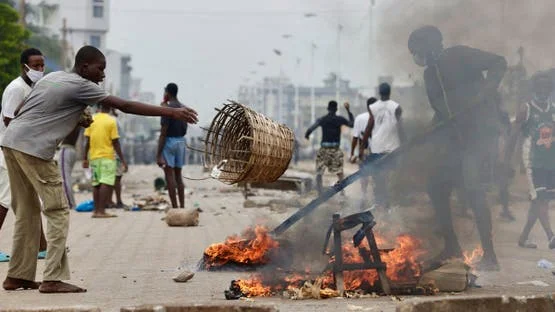According to preliminary reports on Sunday, June 29, 2025, at least seven people have been killed and dozens injured in Togo’s capital, Lomé, during anti-government protests sparked by controversial constitutional reforms.
The demonstrations, held on June 26-28, saw clashes between protesters and security forces, with videos circulating online showing apparent abuses, including the use of tear gas and batons to suppress dissent.
The unrest has intensified concerns about democratic backsliding in Togo, a West African nation already grappling with political tensions.
The protests were organized by civil society groups and amplified by social media influencers in response to recent constitutional changes that critics say are designed to cement President Faure Gnassingbé’s hold on power.
Gnassingbé, who has ruled since 2005 following the death of his father, Eyadéma Gnassingbé, was sworn in as President of the Council of Ministers in May 2025—a powerful new role with no term limits and the ability to be re-elected indefinitely by Parliament.
Constitutional Changes Fuel Public Anger
The constitutional reforms have reshaped Togo’s political landscape, reducing the presidency to a largely ceremonial role now held by Jean-Lucien Kwassi Savi de Tove, a move opposition leaders have denounced as a “constitutional coup.”
Critics argue that the changes allow Gnassingbé to maintain control while sidestepping democratic accountability.
The reforms have drawn widespread condemnation in a region already vulnerable to political instability, with recent coups in neighboring countries like Mali and Burkina Faso highlighting the fragility of democratic institutions in West Africa.
Demonstrations are rare in Togo, where public protests have been banned since a deadly attack at Lomé’s main market in 2022.
However, public outrage over the reforms prompted calls for nationwide protests, with organizers defying government restrictions to demand accountability and democratic governance.
Security Forces Accused of Brutality
Footage from the protests, shared widely on social media despite intermittent internet restrictions, appears to show security forces deploying excessive force.
Tear gas was fired in several Lomé neighborhoods, and some protesters were reportedly beaten with batons, resulting in severe injuries.
Civic groups have called for an independent investigation into the deaths and injuries, urging accountability for what they describe as systemic abuses by Togo’s security apparatus.
Internet access across the country has been heavily restricted, with social media platforms functioning sporadically.
These measures have limited the flow of information and hindered protesters’ ability to coordinate, drawing further criticism from human rights advocates who see the restrictions as an attempt to silence dissent.
A Region at a Crossroads
Togo’s unrest comes amid growing concerns about democratic erosion across West Africa.
The region has seen a wave of coups and political crises in recent years, raising fears that Togo’s constitutional reforms could further destabilize the country.
International observers, including regional bodies like ECOWAS, have called for dialogue to address the crisis, but the government’s crackdown on protests suggests little willingness to compromise.
As tensions in Lomé remain high, civil society groups are pressing for global attention to Togo’s plight.
The deaths of at least seven protesters have underscored the high stakes of the struggle for democratic governance, with many fearing further violence if the government does not address public grievances.
Calls for Accountability and Reform
The violence in Lomé has sparked renewed calls for an independent probe into the actions of security forces and for the government to reconsider the constitutional reforms.
Opposition leaders and activists are urging the international community to pressure Togo’s leadership to restore democratic norms and respect human rights.
For now, Togo remains on edge, with the government’s response to the protests likely to shape the country’s political future.
As the death toll rises, the crisis serves as a stark reminder of the challenges facing democracy in West Africa.




















